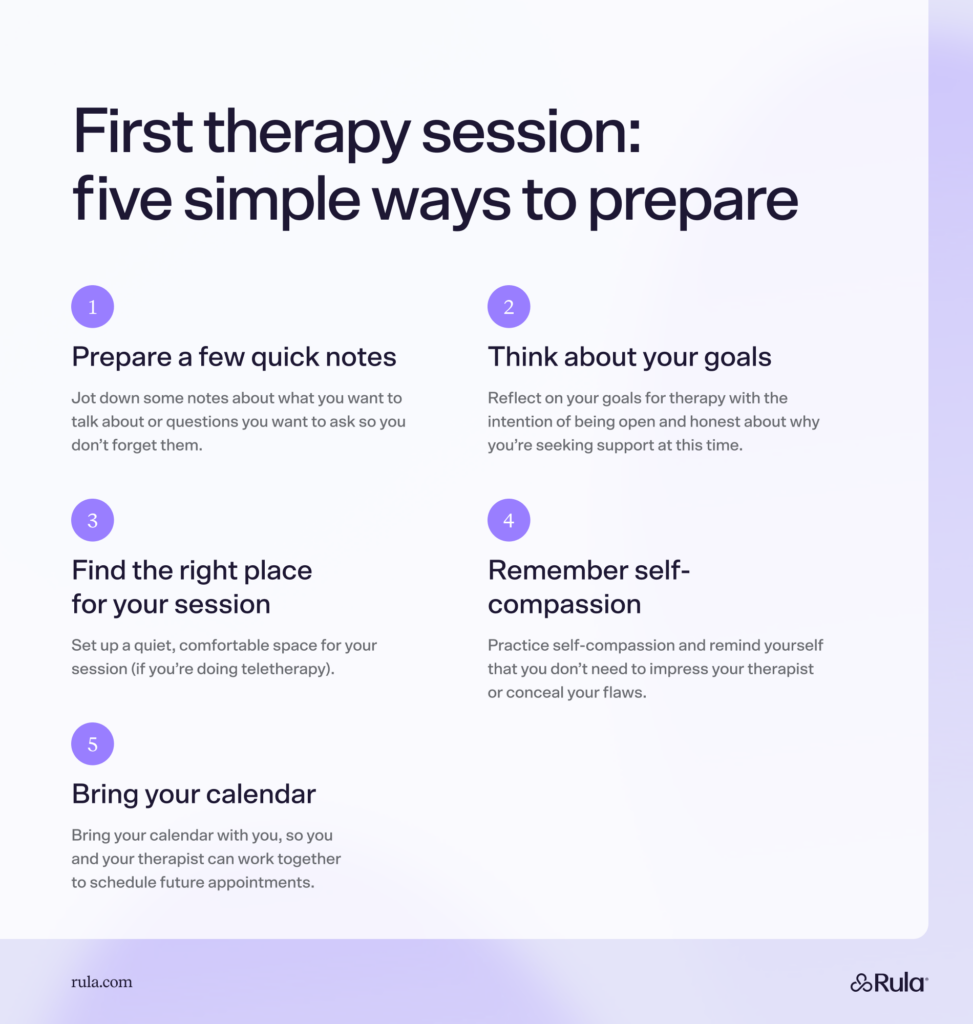Your first therapy session is a time for your therapist to get to know you. During this appointment, they’ll ask questions about your history and what brings you to therapy.
The first session is also a time for you to get to know your therapist and ask questions to ensure that you’re the right fit for one another.
To prepare for your first session, think about what you want to talk about, any concerns you’d like to express, and what you hope to achieve from going to therapy.
If you’ve never been to therapy before, it’s completely normal to have questions about what to expect, especially in the beginning. While different therapists might use different approaches throughout the course of treatment, the first few sessions are always a time to get to know each other. Your relationship with your therapist can heavily influence the outcomes of therapy, so finding the right therapist will likely make your experience more positive and successful.
In other words, you need to feel safe and comfortable with your therapist for you to make progress in therapy. Your first session is an important step in establishing a foundation of trust and determining whether the therapist is the right provider for your needs.

Five tips for a successful first therapy session
Preparing for your first session ahead of time isn’t required. But putting a little bit of thought into what you’re hoping to get out of the experience (and getting a few logistical things organized ahead of time) can help you make the most of your session.
Here are few practical steps you can take to help you prepare for your first therapy session:
Prepare a few quick notes. Jot down some notes about what you want to talk about or questions you want to ask so you don’t forget them.
Think about your goals. Reflect on your goals for therapy with the intention of being open and honest about why you’re seeking support at this time.
Find the right place for your session. Set up a quiet, comfortable space for your session (if you’re doing teletherapy).
Remember self-compassion. Practice self-compassion and remind yourself that you don’t need to impress your therapist or conceal your flaws.
Bring your calendar. Bring your calendar with you, so you and your therapist can work together to schedule future appointments.
Keep in mind that there’s no right or wrong way to prepare for your first therapy session. And you don’t have to do any extensive work ahead of time to be successful.
All you need to do is come to your session with an open mind and a willingness to be yourself. Often, the issues that bring us to therapy have troubled us for a long time. So try to have patience with yourself as you work through them.
The care you need, when you need it
Learn how Rula can support your mental health journey
What will happen during your first session?
The first session is sometimes called an “intake session.” During this time, your therapist will ask you questions to learn more about your strengths, challenges, and reasons for seeking support. They’ll want to know about your family history, medical history, mental health history, and any other details that could impact your care.
Together, you’ll set some short and long-term goals for therapy. But keep in mind that these goals aren’t set in stone. You can always adjust your goals as things evolve, and your therapist can help you decide what to work on during your time together.
Once you establish a baseline for the issues you’d like to address in therapy, your therapist may review the types of therapy they utilize. Some people find this information helpful because they like to understand the “why” behind their therapist’s approach. But if this isn’t important to you or if you find it distracting, you can always communicate that to your therapist.
As the client, you always get to decide what you want to talk about in therapy and the types of interventions or activities you feel drawn to. Whether it’s your first session or your last one, your therapist should never pressure you to discuss anything you’re not ready to explore or engage in any activity you’re uncomfortable with.
What will we talk about in the first session?
Keep in mind that your first few sessions will probably feel a little different than your later sessions. At the beginning, your therapist will ask lots of questions. But in the future, you can expect to do most of the talking, with your therapist offering guidance, reflections, and support.
Your first few sessions are also a time to get to know your therapist and get a feel for how they work. It’s totally fair game to ask them questions too. For example, you might be curious about things like:
Their experience treating other people with similar mental health concerns
Their experience working with people from a similar background, identity, religion, ethnicity, etc.
How they view “success” in therapy
The types of activities they like to incorporate in sessions
Their preferred communication methods between sessions
What to do if you need immediate support between sessions
Their education, background, or any areas of focus or specialization
Of course, these are just a few ideas. You can ask your therapist about anything that feels important to you. Rest assured that therapists want what’s best for their clients, and they know they’re not a fit for everyone. If, after a few sessions, you feel that your therapist isn’t the best fit for you, it’s okay to look for a different provider.
How to know if your therapist is the right fit for you
Your relationship with your therapist is unlike any other. It’s a connection built on confidentiality, transparency, and mutual respect.
At the same time, therapists are human beings. They have unique ways of communicating and different perspectives on the best ways to facilitate lasting change. You might know someone who raves about their therapist. But that doesn’t mean that provider is the best therapist for everyone.
So how do you know when you’ve found the right fit for you? Consider the following questions:
Do I feel safe with my therapist?
Do I feel comfortable sharing all the different parts of my story with them? Even the uncomfortable stuff?
Do I trust my therapist not to judge me no matter what I tell them?
Does my therapist make me feel seen and heard? Is it clear that they’re listening when I speak?
Does my therapist offer the types of therapy I want to try?
Do I feel that my therapist would be receptive to feedback?
Does therapy really work?
Therapy has proven to improve mental and emotional well-being and is linked with many positive changes in the mind and body. Research shows that about 75% of therapy participants experience noticeable symptom relief and improved functioning after six months.
And thanks to recent technology, we now know that therapy can literally change our brains. Research using brain imaging techniques shows that therapy can have a similar effect on the brain as medication.
So how do you know if therapy is working for you? Keep in mind that progress is typically gradual, although you might experience some relief after your first session. Sometimes, just starting the process can feel like a weight off your shoulders.
It may also be helpful to think of therapy as something bigger than what happens during your sessions. Often, meaningful change occurs when you apply what you learn in therapy to situations in your everyday life.
Find a therapist with Rula
Before attending your first therapy session, there are a few things you can do to prepare to make the most of the experience. Take some time to learn about the process and what you can expect from your first few sessions. Remember, this is a time for your therapist to get to know you. But it’s also a time for you to get to know them. So it’s OK to ask any questions that could help you determine whether the provider is the right fit for your needs.
At Rula, we know that starting therapy can feel daunting. So we built a digital therapist-matching program to make it easier for you to find an in-network provider who offers the specialized care you deserve. No matter the mental health issue you’re facing, we’ll help you find a therapist who’s a great fit for your needs. And our network of over 15,000 providers means you can be seen as soon as tomorrow.
Rula's editorial process
Rula's editorial team is on a mission to make science-backed mental health insights accessible and practical for every person seeking to better understand or improve mental wellness.
Members of Rula’s clinical leadership team and other expert providers contribute to all published content, offering guidance on themes and insights based on their firsthand experience in the field. Every piece of content is thoroughly reviewed by a clinician before publishing.




